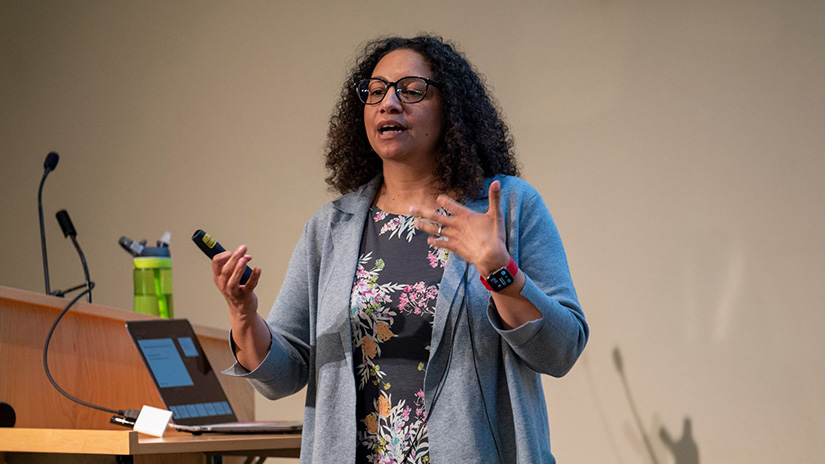UNIVERSITY OF WISCONSIN River Falls
Newsroom
Nilsestuen Legacy Event speaker addresses family farm generational transitions
April 21, 2022 – Family farms have about a 12% chance of being handed down to the third generation, according to the director of the North Central Regional Center for Rural Development and founder of the Purdue Institute for Family Business.
“Family is the backbone of agriculture,” said Maria Marshall, Ph.D. and Purdue University agricultural economics professor. Yet, diverse interests and more family members involved can create conflict.
“More people mean more problems,” Marshall said. “More problems mean more policies. You might need job descriptions and determine who are managers. We don’t see our family with open eyes like we see an employee.”
First-generation to second-generation occurs about 30% of the time.
Marshall spoke at University of Wisconsin-River Falls on April 20 in the University Center as part of the Rod Nilsestuen Legacy Event. Nilsestuen earned his undergraduate degree from UW-River Falls and was the Secretary of the Wisconsin Department of Agriculture, Trade and Consumer Protection agency when he died in 2010. The program’s mission is to encourage creative thinking, research, education and outreach in the areas of cooperative business and development, wise rural land use and leadership. The event was sponsored by the Ralph K. Morris Foundation, a nonprofit corporation that provides development opportunities for emerging leaders expressing interest in applying and advancing the principles of cooperation and in promoting farmland preservation, land stewardship and sustainability. The UW-River Falls College of Agriculture, Food and Environmental Sciences also sponsored the event.
William Nelson, of the Ralph K. Morris Foundation, noted the organization has given over 2,000 programs over the past 20 years on farmland preservation, which was a priority to Nilsestuen.
Marshall’s research and extension programs focus on small business development and family business management on areas such as the resource exchange between the household and the business, and disaster recovery. She has published over 90 articles and presented to over 3,600 established and nascent business owners, nationally and internationally.
There has been very little study into family farm generational transitions, Marshall said, noting there is a major shift coming in farms and other small rural businesses.
“Baby boomers are retiring and that is going to impact businesses in the rural area and small towns,” Marshall said.
Family businesses are the only ones that are affected by socioemotional wealth, which are emotional ties to a business.
What happens is the generation transferring out of the family business often increases the estimated market value of the business by 30% because of the emotions toward the farm or business. The successor generation believes they should get about a 57% family discount.
That can create conflict, Marshall said.
The most important consideration is families need to work together as assets are moved from one generation to the next, which on average takes about 6 ½ years.
The cohesion of the family is the goal as change occurs, she noted.
“We want to keep the family together and talking,” Marshall said. “Families can disagree and stop talking to each other. That is not what we want. We want them to talk and continue to gather during the holidays. We need to think about more than just production.”
The North Central Regional Center for Rural Development is funded by the United States Department of Agriculture National Institute of Food and Agriculture.











